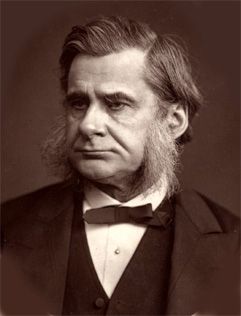
Thomas Henry Huxley’s admiration of William Paley’s Natural Theology (1802) is relatively obscure, at least in comparison to that of Charles Darwin (who wrote to a friend just before the Origin was published, “I do not think I hardly ever admired a book more than Paley’s Natural Theology. I could almost formerly have said it by heart.—”). Yet Huxley’s admiration seems to have started earlier and continued later. In part 1, I quoted passages from Huxley (above) and his sometime student Henry Fairfield Osborn that together suggested that Huxley was a fan of Paley’s when he was a boy (regarding Natural Theology as a Sabbath treat) and when he was a middle-aged scientist at the height of his powers (keeping the book at his bedside). But Huxley invokes Paley for a specific purpose: to defuse the complaint that Darwin’s views “abolish Teleology.”
In “On the Reception of the ‘Origin of Species’” (published in volume 2 of The Life and Letters of Charles Darwin [1887]), as I mentioned in part 1, Huxley cites Paley as authority for the proposition “that the ‘production of things’ may be the result of trains of mechanical dispositions fixed beforehand by intelligent appointment and kept in action by a power at the centre.” A footnote attached to “centre” refers to the twenty-third chapter of Natural Theology, “Personality of the Deity,” where Paley argues that establishing the existence of design serves to establish that the designer is a person, a conscious agent with beliefs and desires, not a mere impersonal principle of nature, and indeed the section of the passage from “the result” to “the centre” is, though unenclosed by quotation marks, a verbatim quotation from Paley.
In the Rede lecture as reported by Nature, Huxley quoted exactly the passage from Paley that he deemed relevant. I’ll reproduce it here, adding the sentence before and the sentence after (in boldface) for the sake of context.
There may be many second causes, and many courses of second causes, one behind another, between what we observe of nature, and the Deity: but there must be intelligence somewhere; there must be more in nature than what we see; and, amongst the things unseen, there must be an intelligent, designing author. The philosopher beholds with astonishment the production of things around him. Unconscious particles of matter take their stations and severally range themselves in an order so as to become collectively plants or animals, i.e. organised bodies with parts bearing strict and evident relation to one another and to the utility of the whole; and it should seem that these particles could not move in any other way than they do, for they testify not the smallest sign of choice, or liberty, or discretion. There may be particular intelligent beings guiding their motions in each case, or they may be the results of trains of mechanical dispositions fixed beforehand by intelligence or appointment and kept in action by a power at the centre. But, in either case, there must be intelligence.
(The quotation is accurate, except for minor details of punctuation, which I’m not bothering to correct here, since I don’t know what edition of Natural Theology Huxley was reading: there have been a lot.)
Paley is not conceding anything here that was not conceded earlier in Natural Theology. In the second chapter, continuing his discussion of the famous example of a watch found on a heath, he supposes that it is discovered that the watch is capable of reproducing itself. The lucky finder of the watch would, Paley says, acknowledge that a parent watch was “in some sense” the maker of the child watch, yet in no sense would it be “the author of its contrivance, the cause of the relation of its parts to their use” in the same way that a carpenter is responsible for the functional organization of a chair (or, of course, a watchmaker is responsible for the functional organization of a watch). The novelty in the twenty-third chapter is the generalization of the point: the fact of design, for Paley, isn’t committed to any particular account of how the design is effected.
That’s the crucial principle, as far as Huxley is concerned: if the fact of design isn’t committed to any particular account of how the design is effected, as in effect recommended by what he calls “the wider teleology,” then it presents no obstacle to the acceptance of evolution. (Significantly, though, Huxley never seems to comment on the antecedent issue of whether it is possible, as Paley alleges, to detect design in the natural world. The fact that he refers to the explananda in such vague terms—“the phenomena of the universe”; “things”—suggests to me that he was unimpressed.) In part 3, I want to say a word about the importance of Huxley’s attributing the principle to Paley (of all people) before I turn, at last, to the question of whether Paley, as Huxley claims, “proleptically [i.e., in advance] accepted the modern doctrine of Evolution.”

